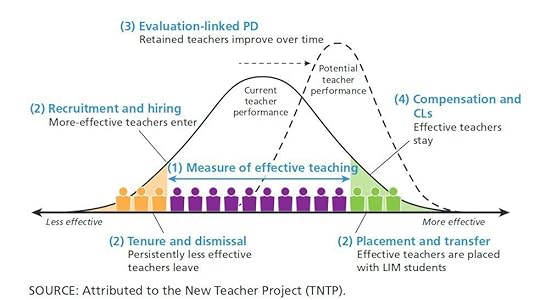 Charles’s
Comments
(group member since Jul 01, 2019)
Charles’s
Comments
(group member since Jul 01, 2019)
Charles’s
comments
from the Fields MathEd Book Club group.
Showing 1-6 of 6
 Some other interesting articles along this topic.... what does the data *actually* say?
Some other interesting articles along this topic.... what does the data *actually* say?Paradoxes of Increasing Teacher Pay
https://medium.com/age-of-awareness/p...
Why Cutting Costs is Expensive: How $9/Hour Software Engineers Cost Boeing Billions
https://medium.com/javascript-scene/w...
 https://www.bloomberg.com/opinion/art...
https://www.bloomberg.com/opinion/art...
From the article:
Considering the program’s failures — and all the time and money wasted, and the suffering visited upon hard-working educators — the report’s recommendations are surprisingly weak. It even allows for the possibility that trying again or for longer might produce a better result, as if there were no cost to subjecting real, live people to years of experimentation with potentially adverse consequences. So I’ll compensate for the omission by offering some recommendations of my own.
1. Value-added models (and the related “student growth percentile” models) are statistically weak and should not be used for high-stakes decisions such the promotion or firing of teachers.
2. Keeping assessment formulas secret is an awful idea, because it prevents experts from seeing their flaws before they do damage.
3. Parent surveys are biased and should not be used for high-stakes decisions.
4. Principal observations can help teachers get better, but can’t identify bad ones. They shouldn’t be used for high-stakes decisions.
5. Big data simply isn’t capable yet of providing a “scientific audit” of the teaching profession. It might never be.
Commentary on BoingBoing:
https://boingboing.net/2018/06/27/wor...
 It seems that Cory Doctorow has been very consistently using the #WeaponsOfMathDestruction tag in his articles for the past several years. You can find a host of interesting articles that show some stories that do a good job of following with the key ideas in the book.
It seems that Cory Doctorow has been very consistently using the #WeaponsOfMathDestruction tag in his articles for the past several years. You can find a host of interesting articles that show some stories that do a good job of following with the key ideas in the book.https://boingboing.net/?s=weapons+of+...
 I would love to get people's take on the bias loop that is created when academic performance/quality is measured and gamed. It seems like the not-so-recent phenomenons of grade inflation and ineffective accountability measures have been pretty unyielding to system efforts of mitigating them.
I would love to get people's take on the bias loop that is created when academic performance/quality is measured and gamed. It seems like the not-so-recent phenomenons of grade inflation and ineffective accountability measures have been pretty unyielding to system efforts of mitigating them.It seems we are coming full-circle on the charter school issue in the United States, with a much stronger resistance to a lot of the metrics-based education reform that was initiated or promoted during the Obama administration
https://www.washingtonpost.com/local/...
 It strikes me in particular how listening to this in 2019, many of Cathy's warnings about the future feel like they are already in the rear-view mirror. Not that the issues are no longer with us, but that they have developed considerably since the writing of the book.
It strikes me in particular how listening to this in 2019, many of Cathy's warnings about the future feel like they are already in the rear-view mirror. Not that the issues are no longer with us, but that they have developed considerably since the writing of the book. The data giants of Facebook and Google are now being tackled with heavy regulation in Europe through the GDPR and there are threats (empty?) from the Democratic candidates in the 2020 primaries which might hint at further legislation in the U.S.A., another huge market for these big data companies.
It would be very interesting to enumerate how the warnings have met up with concrete policy changes over the past several years.
 I have been listening to WMD on my morning workout / walk to work and it's incredibly easy to digest. I love how Cathy keeps it relatable, and good on her and her editing team for putting this together.
I have been listening to WMD on my morning workout / walk to work and it's incredibly easy to digest. I love how Cathy keeps it relatable, and good on her and her editing team for putting this together. Audio is usually not my first choice for "math" books as (despite their best efforts) they often get into verbal descriptions of algebraic relationships which I find impossible to follow unless I can sit down and visualize it. It is natural as this book is more of a social commentary on the uses of mathematics.

